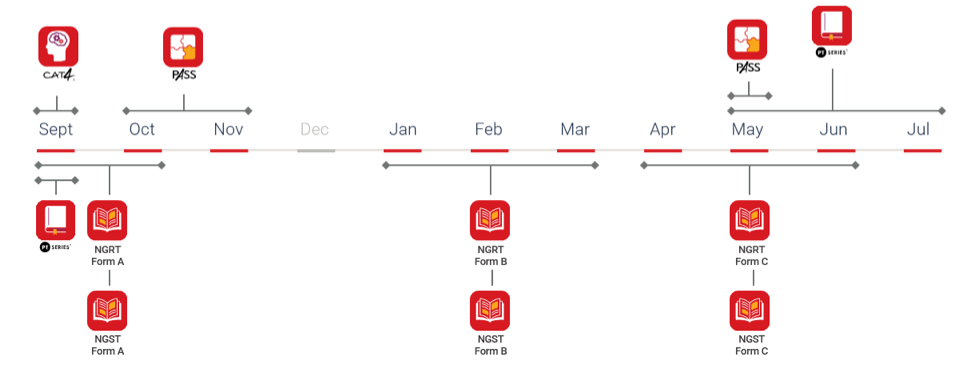The Assessment Cycle
Top 10 tips for planning your Assessment Cycle

Suggested assessment timetable
Our Assessment Insights team of Education Advisers have put together the following top tips based on their experience of working with schools across the UK.
1. Establish your assessment priorities for the year ahead
- Following a review of your assessment data from the previous year, what conclusions have you made regarding your priorities for this year? Are there specific cohorts within the school or subjects which require particular attention? Have you communicated these to your staff?
- Ensure staff know they can access information about assessments on our support hub.
2. September/October - obtain a baseline
- To obtain a baseline of academic potential, strengths and areas for improvement, and indicative future performance, use CAT4 in the autumn term. For new starters throughout the year, try additional half-termly or termly sittings.
- For 11-12 year olds, level 11T of the Progress Test Series will also enable you to obtain baseline data at a key transition point in English, maths and science.
- Don't forget to watch our free pre-testing essentials training videos for CAT4, PT Series, NGRT, and PASS. In under 10 minutes you'll know everything you need to administer these assessments successfully.
3. October/November – assess reading and spelling to identify barriers to learning
- If reading is a key priority area in your school, you may wish to test with NGRT early in the autumn term, and then again termly thereafter. However, if using CAT4 in September/October you will want to ensure sittings are staggered so as not to overload students.
- You may also wish to assess your students’ spelling using NGST to identify pupils who require intervention. We recommend administering NGST three times a year, once in each term, to allow the most effective monitoring of spelling progress.
4. October/November – check in on Pupil Attitudes to Self and School
- This is a good time to monitor how your students are feeling about themselves as learners and school. Assessing students using Pupil Attitudes to Self and School (PASS) can help focus your pastoral systems on the areas that matter, identifying any barriers to learning and subsequently supporting them so that they can thrive positively at school.
5. November/December - consider follow-up assessments
- Re-evaluate your data, look for surprising or unexpectedly low scores. Would these students benefit from further investigation?
- For example, from the results of NGRT, you may have identified students who you want to explore the Reading Diagnostic Pathway with.
- Our Assessment Insights team can help you to interpret your data to identify pupils who may benefit from further investigation and/or support.
6. February – mid-year check point
- Complete the second NGRT and NGST (Form B) assessments. When completed termly, these provide a summary of the progress made over time, making comparisons to previous test scores, to identify successes and those in need of further support or intervention.
- You can generate a Reading and Spelling Group Report for Teachers, which shows the scores of NGST and NGRT together, providing a summary of the standardised age scores for the chosen group of students, presented both in rank order and compared to the national population.
7. May – monitor Pupil Attitudes to Self and School
- It would be useful to administer the second PASS survey with your students, analysing any interventions that were put in place following the first survey. Are identified children now beginning to thrive? Does the support offered need to be re-evaluated?
8. May/June – begin end of year testing
- This will take the form of Progress Test assessments (English, maths and science), NGRT and NGST.
- We recommend scheduling testing throughout June, with staggered sittings within the morning sessions, when students have better focus and more energy, so as not to overload them.
9. June/July - start your analysis and interpretation journey
- Watch our free post-testing essentials training videos for CAT4, PT Series, NGRT, and PASS. Watch wherever and whenever you need to review your data.
- Combination reports can compare CAT4 with PTE/PTM and NGRT assessment data.
- All this analysis will help in discussions around next steps and forward planning.
10. Book a free data consultation with an Assessment Insights Education Advisor
- The Assessment Insights team can advise on the analysis and interpretation of your data, maximising insights from your assessments.
- This guided analysis of your cohort data will help you to identify key groups of students to focus on, areas of the curriculum to reinforce and offer useful suggestions for next steps.
- An appointment for this free, in-depth service can be made here.

